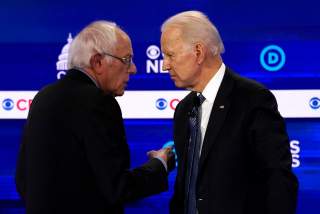What to Expect Today on Super Tuesday
Will Sanders beat Biden?
Today is Super Tuesday, where more states hold their presidential primaries and caucuses than any other single day of the calendar. A third of the potential national convention delegates are available to be won, in contests from every region of the country. The biggest winner is often the eventual nominee of their party.
Fourteen states will vote today: Alabama, Arkansas, California, Colorado, Maine, Massachusetts, Minnesota, North Carolina, Oklahoma, Tennessee, Texas, Utah, Vermont, and Virginia.
Entering Super Tuesday, the Democratic primaries are increasingly a two-person race. Senator Bernie Sanders of Vermont, and former Vice President Joe Biden, currently have sixty delegates and fifty-four delegates, respectively. Sanders has won the popular vote in the Iowa and Nevada caucuses and the New Hampshire primary, while Biden has won the South Carolina primary and just received major endorsements from former candidates.
Former Mayor of New York City Michael Bloomberg has invested his entire campaign into the Super Tuesday primaries. Skipping the first four contests, the multi-billionaire has sunk over $600 million of his own money to flood the airwaves with advertisements and campaign infrastructure. Bloomberg’s margins, and how his financial investments translate into real votes, will reveal whether he’s competitive against Sanders or Biden. The candidate said today that he does not expect to win any states outright, and that there will be a brokered convention where he will be chosen as the candidate.
The largest Super Tuesday state is California, which has 415 delegates, nearly a third of the day’s total. Every poll in the lead-up to today has Sanders in the lead by a comfortable margin, meaning he’d take the bulk of the delegates. He’s followed by Biden, Bloomberg, and Senator Elizabeth Warren of Massachusetts (who, depending on the poll, is on the cusp of viability for delegates qualification).
If Warren is able to win a margin of California, and qualify in the New England primaries, it would go a long way towards boosting her campaign. Despite only possessing eight delegates currently, Warren shows no signs of suspending her campaign. If a brokered convention does take place, her small holds could become powerful chips.
The most far-flung contest taking place is the caucus in American Samoa. A U.S. territory, it will not participate in the November general election. However, it will contribute six delegates to the Democratic National Convention. This is the best chance Rep. Tulsi Gabbard has of winning any representation at the convention. The thirty-eight-year-old congresswoman and military veteran has been running an insurgent antiwar campaign that she promises to take all the way to the convention, although she’s been polling at an average of 1% in each primary. Originally born in American Samoa and of Pacific Islander heritage, winning even a single delegate from the territory would qualify her for the remaining Democratic debates.
The second-largest state, and perhaps the best indicator of the primary going forward, is Texas. The Lone Star state and its 228 delegates is a tossup, a virtual tie in the polls between Sanders and Biden. Sanders has made a major play for the state, based on his widespread support among Hispanic voters. But Biden has made a last-minute bet on the state, including holding his last rally in Dallas and being endorsed by former Texas senate Democratic nominee Beto O’Rourke.
If Bernie Sanders is able to achieve a narrow victory in Texas, it will recement his position as the current frontrunner and he’ll retain the possibility of winning the nomination outright. But if Joe Biden is able to win the state, based on his growing momentum from the past seventy-two hours, it will almost guarantee that the Democratic primary will result in a brokered convention in July.
Hunter DeRensis is senior reporter with the National Interest. Follow him on Twitter @HunterDeRensis.
Image: Reuters

